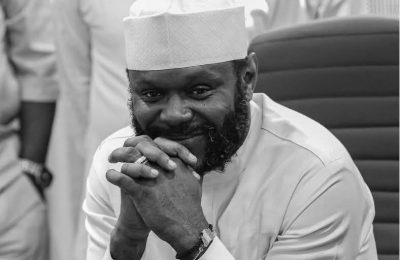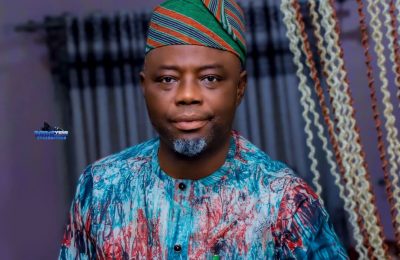
Mr Abdul-Kadir Ahmed is the Managing Director/Chief Executive Officer of the NLNG Shipping and Marine Services Limited (NSML). In this interview with select newsmen, he talked about developmental stride in the nation’s shipping and maritime sector. TOLA ADENUBI brings excerpts.
Nigeria still struggles with the acceptance of its Certificate of Competence (CoC) for seafarers internationally. Why is this so?

Unfortunately, it is an ongoing activity with the acceptance of the CoC and I know the Nigerian Maritime Administration and Safety Agency (NIMASA) is doing a lot with regards to ensuring the CoCs are accepted internationally. The key element boils down to the comfort that we are able to provide to other regulatory bodies internationally about the standards with a lot of money already invested in the Maritime Academy of Nigeria (MAN), Oron. They have done a lot in upgrading the academy, which is a step in the right direction and I know the Director-General of NIMASA is also very passionate about pushing that.
For us at NSML, we have always been available and we will continue to support NIMASA with regards to pushing that because it also works in our favour. If the Nigerian CoCs are accepted internationally, it makes life easier for our seafarers to renew their CoCs. It also creates a large pool of resources. But there are no shortcuts to it and that is one thing I will always make very clear. Acceptance of CoCs looks bilateral but there are some fundamentals towards the bilateral element, which is that the other party must be comfortable that the quality of the CoCs are at the level that is sustainable.
The one way we can ensure that is to be sure that the processes of assuring quality is standardised and assured by everybody and that is currently ongoing and I am absolutely confident that in a very short while, that would be achieved.
We will continue to support that because it is in line with our vision and I will also tend to emphasise that supporting the growth and development of the Nigerian maritime industry starts from the fundamentals of building capacity and ensuring competence in capacity.
Does NSML training partnership with the Maritime Academy of Nigeria, Oron, still exist?
The relationship between NSML and MAN, Oron, is an ongoing relationship. The purpose of the creation of NMSL was to domesticate shipping and maritime skill sets locally and, to do that, it means you have to develop competence and capacity within Nigeria. That was the essence of our relationship with MAN, Oron.
We supported them in the past in terms of curriculum. We have done an assessment and overview of what they need to do. We have done gap analysis and supported them in terms of where they were and where they needed to be. We will continue to support them.
A lot has been done at the Maritime Academy of Nigeria in terms of upgrading the facility because that is one critical area. Technology is changing, the competence required is equally evolving.
With knowledge and competence, you cannot be static because everything around you is evolving. That is the challenge of seafarers training and development, not just in Nigeria, but globally.
From our perspective, from what we have seen, there have been a lot of investments in upgrading the Maritime Academy of Nigeria as well as upgrading and making their curriculum relevant. NMSL, as part of stakeholders in the industry, is happy to continue to support in that respect. If the Maritime Academy is able to achieve on its objective, it benefits us as stakeholders because the people make the maritime industry what it is.
How many vessels are currently under the management of NSML and what are your catchment areas in the global market?
We have 12 vessels under management, 11 LNG vessels and one LPG vessel currently. Our expectation, in line with our growth and diversification objective, is to grow the number. We started out as an LNG vessels manager. We have now expanded into bringing LPG. We are hopeful that we will expand both the LPG fleet as well as move into oil tankers and products so that we cover the whole gamut of energy vessels under our management.
Our vessels go all over the world. We have vessels loading cargoes in North America, delivering it to Europe. We have vessels loading cargoes in Nigeria and delivering it to Europe, South Africa and far East – Japan, China, South Korea, Indian subcontinent. Our vessels go everywhere. The one area our vessels don’t go to Russia.
The only way you can have a vessel that is able to trade in all of these areas boils down to the comfort that those areas would have viz-a-vis your operations and that is where competence and flag assurance come in.
That is why it is essential that we create and align ourselves to the global standards. We can have a Nigerian standard but we should make sure it is not below the global standard. In actual fact, there is no reason why we can’t lead by pushing for a higher level of standard, not below.
None of your vessels are registered with the Nigerian flag, why is that?
The ship registry issue is the reason. The last time we spoke, NLNG vessels are registered under a different flag for a number of reasons. One, of course, is the registry. We have international ocean-going vessels and there has to be that level of comfort and assurance of the registry and acceptance of the registry internationally for a Nigerian-flagged vessel to operate and trade openly.
It is a work that is ongoing as well and we are participating at NSML and NLNG level, engaging with NIMASA. We are part of that committee that has been set up to review what needs to be done so that the Nigerian flag and registry get to that level of international acceptance and, for us, it is a win-win situation once that is achieved. It is an ongoing discussion, we are really aligned with the desire and objectives of NIMASA to have that and we will continue to support that because we believe if we can achieve that, it would definitely support the development of the Nigerian maritime sector.
On the effect of climate change and reduction of greenhouse gas emissions as well as other shipping decarbonisation objectives by the International Maritime Organisation (IMO), give us an insight into what NSML is doing in that direction in Nigeria?
The greenhouse gas emission and decarbonisation objective, which is in line with energy transition and climate change, we all have a duty and responsibility to live and utilise the resources in a sustainable manner so we can pass it unto the next generation. That requires us not to overly pollute and to ensure effective utilisation of the resources. This is where the argument with the discussion around greenhouse gas emission, the impact and decarbonisation comes in.
The fact that as a people today, we have advanced so much technologically, we need to ensure such advancement does not come at a detriment to the current environment and the future sustainability of life in the world. That is really the essence of it. Part of it is looking at how we consume and what we emit into the environment and shipping is one critical area in terms of that because shipping has become very central to the world economy. It is really that link that binds global trade.
We know that historically, shipping is one of the major emitters of greenhouse gas. There has been an increased focus in terms of cleaning up shipping operations to make it more efficient, to ensure we decarbonise our processes and contribute towards the movement to net zero and that is being driven primarily by the International Maritime Organisation (IMO), which has the regulation that requires a progressive reduction of greenhouse gas emission right down to 2050 where the expectation is net zero. The target is 40 percent by 2030.
We at NMSL and NLNG subscribe fully to that and we have our own decarbonisation objective as a group as well to drive the change in terms of our operations so that we achieve that. In NSML, we are looking at it from three folds. The first element is that recognition and realisation of the impact of carbon emission into our environment. That recognition is the realisation of our contribution to it. That is very critical and you can’t change what you cannot measure.
From our point of view, it is simply starting from having a baseline assessment of what exactly are we emitting case by case and that is what we have imbibed. We are two years into it. We have aligned ourselves and developed the mechanism for measurement. So, for every of our ocean-going vessel, in every aspect of our operations, we know exactly how much we are emitting into the environment from our operations. That is the starting point.
The second aspect of it is that once you measure and know, what next? That is very crucial. So is it just for knowing sake or knowing from the point of view of recognising what you are emitting and what you needed to do to control and reduce it?
It starts from essentially the change in terms of the way we operate, which has been ongoing. Whether it is the change in terms of the kind of fuels we use on our vessels, the way we plan our voyages or the way we ramp up our boilers? That is holistic change in the way you operate because the way you operate contributes to whether it is high or low. You can manage it from that holistic change in the way you operate your facilities and vessels. That is something we have started doing.
Another aspect is simply looking forward, just simply using the same equipment, the same vessels, yes it will enable you to reduce but it won’t push you to net zero. There is that focus on technology, retrofitting, new equipment and vessels and it is something that we are looking out from the good perspective when we were looking at our fleet renewal activities.
We are not just simply renewing our fleet using the same kind of technology, but we are taking advantage of emerging technologies to either retrofit or acquire new tonnages that are much more efficient so that our operations fully contribute towards the net zero objectives of IMO, Nigeria and NLNG.
Decarbonisation and the regulation is an opportunity, it boils down to competitiveness and relevance. All of us are in this business in pursuit of relevance. You have to be relevant to yourself and every stakeholder and the environment applies to every one of us. So, we do have a responsibility to our environment.








